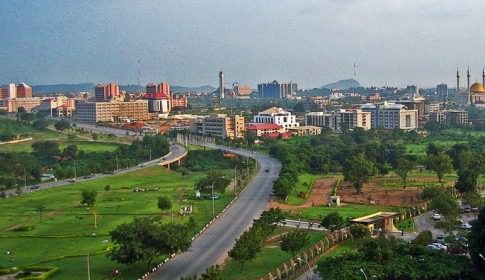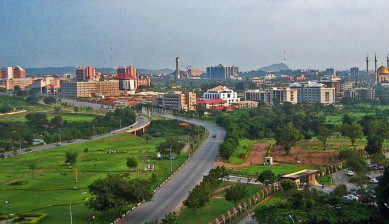National Issues
Abuja Land Ownership As Cesspool of Thievery and Vultures -By Dayo Olaide


Living in Abuja can be a fantastic experience. Commonly regarded as Nigeria’s sole planned city, Abuja is a beauty to behold, with grandiose buildings, fantastic road networks and boulevards that make pleasurable commuting experience. Well manicured green areas spice the pleasure. The roads come alive under the lights at night. Stowed away in the nights are gardens and clubs to host fun seekers. Mega-chain stores adorn the city’s corners to indulge shoppers (if you’ve got the naira) and cinemas for family relaxation. It is a city of affluence and you cannot miss the ‘smell’ of power in the air. The city is like a big construction site; it keeps changing and improving to achieve the original dream of a truly planned city.
The late Oronto Douglas is credited with the coinage – ‘Abuja is city of sin.’ There’s money to be made and lots of openings to throw it into – sex, drugs and ostentatious living. For a landlocked city, without the riveting Lagos-type commerce – hustling and bustling and a people who never sleep, a lot of the money comes from corruption, mostly bribery, kickbacks, extortions, and diversions of government revenue. Politicians, super-civil servants, clergies, and NGOs sit atop stinking wealth. The real estate sector is one of the biggest recipients of these dirty monies. Palatial, opulent homes spring up at every corner of the metropolis. Estate developments follow in succession. But rather than crash, the costs of housing remain at the rooftop. Not even during the economic and financial crisis did housing prices crash in Abuja.
Like oil in the Niger Delta, real estate is where the vultures feast in Abuja. And it is a good next place for the searchlights of President Buhari’s anti-corruption campaign. It is a multi-billion dollar ‘safe haven’ for proceeds of Nigeria’s monstrous network of corruption entrepreneurs. Corruption has taken the sector captive and locked affordable housing out of the common man’s reach. Abuja currently accounts for 10 percent of Nigeria’s 17 million housing deficit, according to Senator Bala Mohammed, the immediate former FCT Minister, yet many livable houses are locked up except for cockroaches and cobwebs and, on occasions, for the rich men’s mistresses who sneak in and out of the city’s cold night.
The land swap initiative of the previous administration was its biggest policy response to mounting housing deficits in Abuja. Under it the former FCT Minister planned to handover swathes of undeveloped lands to real estate developers in exchange for provisions of infrastructure including roads, electricity, potable water, drainages and sewer lines. For almost three years the administration was unable to address allegations of exclusion and lack of transparency levied by locals who feared the scheme could not be trusted.
The initiative was expected to draw billions of investment from financial institutions and competent real estate developers and create over one million jobs. But the problem is that competent real estate developers are in short supply. Going by the experience of many Abuja residents, every Chinedu, Segun and Mohammed can become estate developers overnight. Labour unions, even church associations have joined the train. Few of them put integrity foremost in their deals. Others, especially latter-day opportunists drawn by the quick buck syndrome care less. Integrity has no place. They are deeply entrenched in the land rackets; randomly putting up for sale lands they neither own nor have the rights to sell, and pocketing millions, even billions, only to disappear when authorities come threatening, leaving subscribers to ‘sort out’ the authorities or risk losing their investments. Helpless subscribers are frequently forced to take the ‘buy back’ option – paying for already purchased plots many times over.
With vultures ensconced top to bottom of Abuja real estate, transactions bear too many uncomfortable similarities with oil, especially the opacity, corruption and savagery which make it difficult for any potential investor and land owner to walk through a warped system deliberately put in place to screw him. Buoyed by the Nigerian factor, these dirty dealers write and rewrite and interpret the rules of the game according to their dictates for subscribers to follow; sometimes, and according to many battered victims, mostly in connivance with official acquiescence. The scale of impunity stinks and President Buhari would do poor residents a great favour by beaming his anti-corruption light to clean up the sector.
Many notorious latter-day estate developers are known to authorities, including police and the economic and financial crimes commission. In fact, irredentist ones have been detained many times over but manage to get off the hook always. As a result they keep coming back with even more disingenuous deals to con the public.
The property-related corruption is deep and inclusive. The bureaucracies provide the architecture and cover for the act while civil servants, elected and non-elected officials and their private sector collaborators feast on the public. It is staggering how many locked-up houses in Abuja are owned by super-rich civil servants – mostly as share from racketeering. In many of the con deals, subscribers and the state are losers.
In one example, Uromi, a subscriber to an estate in one of Abuja’s satellite towns was forced to remain a tenant because she could not take possession of her plot of land for six years. Uromi’s allocation letter indicated that she was allocated a fully-built 3-bedroom bungalow worth N23million. The allocation letter had been made this way to satisfy an understanding with the authorities – where the estate developer was to build and sell approved housing types. This type of agreement requires third party financing which many emergency estate developing companies cannot achieve. Instead, they hurriedly put up the lands for sale, often before perfecting their allocation papers and disappear as soon as they can no longer meet demands for kickbacks from their collaborators in regulatory and oversight agencies. In fact, Uromi paid N4million for a piece of land but for six years after full payment could neither take possession of the land nor build.
Many residents in Abuja have fallen victims to this vicious, untouchable notorious estate developers. Igberase’s case was quite similar. She was over the moon by the thought of becoming a landlord and quickly got four of her family members to subscribe to plots of land that had been put up for sale by a Chaplaincy. All five made initial deposits in order to obtain letters of allocation. The rest was to be liquidated through monthly instalments. Several months after and there was no information from the chaplaincy. It was then Igberase decided to inquire. She found out the Priest in charge had actually processed the papers in his name. The Chaplaincy and subscribers had been swindled.
Olumide Ijobgon also subscribed to an estate in Abuja, having paid half the agreed cost of the land with agreed monthly payouts agreement for balance. Midway into the agreement Olumide gets notice that the property had become subject of a dispute and reassurance that the matter would be sorted out. With barely three monthly instalments outstanding he is finally given the bad news – the land had been lost to the other developer, and he (Olumide) is to be reallocated a new plot somewhere else. The new location is in a far-flung new site but Olumide has little or no option, he could either accept the reallocation or seek a refund. Either way it is win-win for the developer. If Olumide takes the new land, he would have to wait longer – several years more – before development creeps into the new place. And it could several take years to get a refund, if ever. Even at that, he can only anticipate his deposit, not the market value of the land no matter how long he waits.
With vultures ensconced top to bottom of Abuja real estate, transactions bear too many uncomfortable similarities with oil, especially the opacity, corruption and savagery which make it difficult for any potential investor and land owner to walk through a warped system deliberately put in place to screw him. Buoyed by the Nigerian factor, these dirty dealers write and rewrite and interpret the rules of the game according to their dictates for subscribers to follow; sometimes, and according to many battered victims, mostly in connivance with official acquiescence. The scale of impunity stinks and President Buhari would do poor residents a great favour by beaming his anti-corruption light to clean up the sector.
The man loved by many based on his avowed austere lifestyle and integrity and loathed alike for the high-handedness and clampdown on freespeech as military head-of-state in the 1980s has started well with his change agenda in the dirty oil sector. Money launderers and scoundrels in the housing sector right in the President’s backyard should be next to hear from his anti-corruption gong.
Dayo Olaide writes from Abuja.


















